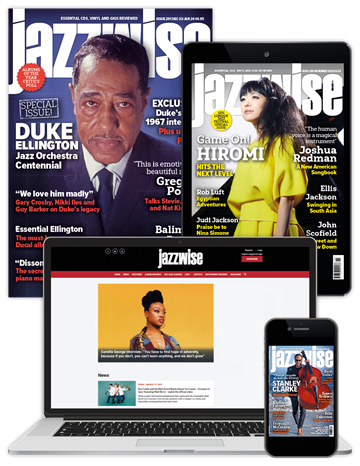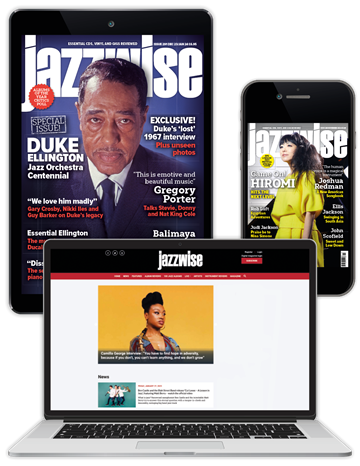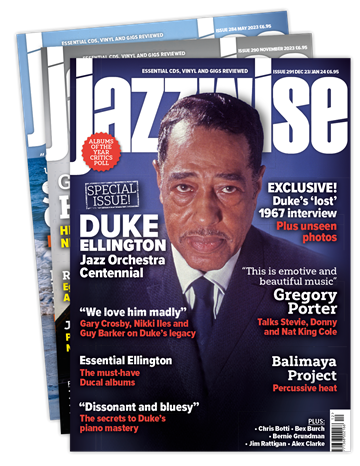Alexander Hawkins Ensemble: Album Interview: All There, Ever Out
Author: Daniel Spicer
View record and artist detailsRecord and Artist Details
Musicians: |
Otto Fischer (g) |
Label: |
Babel |
Magazine Review Date: |
March/2012 |
Catalogue Number: |
BDV1196 |
RecordDate: |
12 and 13 July 2011 |
Just 30-years-old, Alexander Hawkins has already emerged as probably the preeminent UK avant-jazz keyboardist of his generation. In the trio NEW, he’s pushed the Hammond B3 organ into previously inaccessible improv territory but this latest as a leader (follow up to his ensemble’s 2009 debut No Now Is So) sits closer to his work in the trans-Atlantic Convergence Quartet. Largely playing acoustic piano (except for the track ‘AW/LJ’, in which the Hammond provides bluesy smears and smudges), Hawkins leads a mercurial sextet through cerebral compositions that are both rigorous and playful. Anthony Braxton’s infl uence is notable in some of these neat little puzzles: as on ‘Tatum Totem III’, which feels like an accumulation of separate, unrelated patterns, overlaid until a new, previously hidden image emerges. The ensemble is on stellar form, too, with Orphy Robinson’s African shapes rubbing up weirdly against Otto Fischer’s creeping, David Lynch-ian twang. Just goes to show you can have brains and soul.
Jazzwise talks to Alexander Hawkins about the album
How much of this music was strictly written by you, and how much was a product of the musicians’ personalities?
I believe in writing music for the particular personalities of the group. So part of my thinking in putting the group together in this way was that I like the type of decisions these guys often make. And that includes the fact that sometimes they make the type of choices that I simply can’t foresee. I think successful bandleaders create situations in which the members of the group shape each other’s playing in interesting ways.
There’s an interesting line-up of instruments on this album, creating some surprising arrangements.
For me one of the fascinating things about a group dynamic is how each musician brings everything he or she knows to the table, even if that’s not explicitly “in focus”. Bandleading in this respect is not unlike trying to construct a Venn diagram with the most interesting possible intersections.
Would you like to work with Anthony Braxton?
I would love to work with him, of course. The piano chair in Braxton’s music has always been very inspiring to me: thinking just of the late-1970s/early-80s records, where you can hear Muhal Richard Abrams, Anthony Davis, and Marilyn Crispell realising his stuff – it’s an awesome proposition.
How does the music here differ to the music you’ve made with Convergence Quartet?
Collaboration is a methodology I value deeply, and so something like the Convergence Quartet only sounds the way it does because it contains four musicians temperamentally predisposed to come together to create a common music. But I do enjoy working as a leader, and it does lend a different type of freedom than in more fully collaborative projects as to the overall shape of live sets and recordings too.
You combine different styles of piano on this album, with turbulent free-jazz sitting next to an older stride-infl uenced style.
I play what I know, in the hope that one of those unguarded moments will come along, and I’ll start playing what I don’t know, which is a far more exhilarating place to be. I think it’s really rare for a performance to be able to begin completely in the unknown, great though that is. I love the tradition of piano players: Tatum is my hero, and from there, you can go anywhere.

Jazzwise Full Club
- Latest print and digital issues
- Digital archive since 1997
- Download tracks from bonus compilation albums throughout the year
- Reviews Database access
From £9.08 / month
Subscribe
Jazzwise Digital Club
- Latest digital issues
- Digital archive since 1997
- Download tracks from bonus compilation albums during the year
- Reviews Database access

